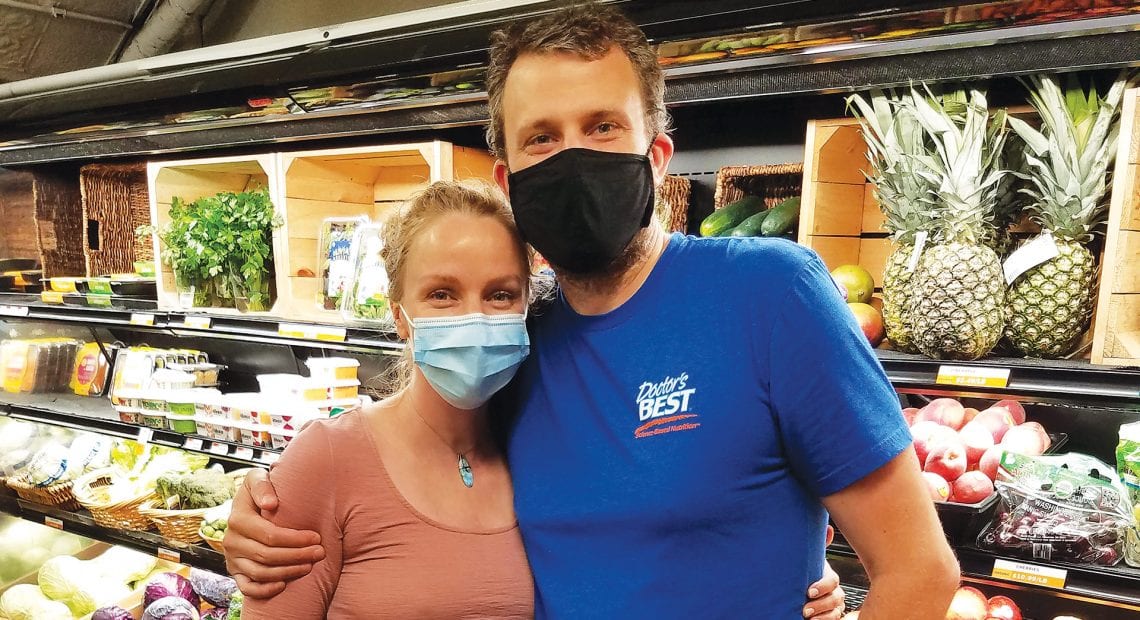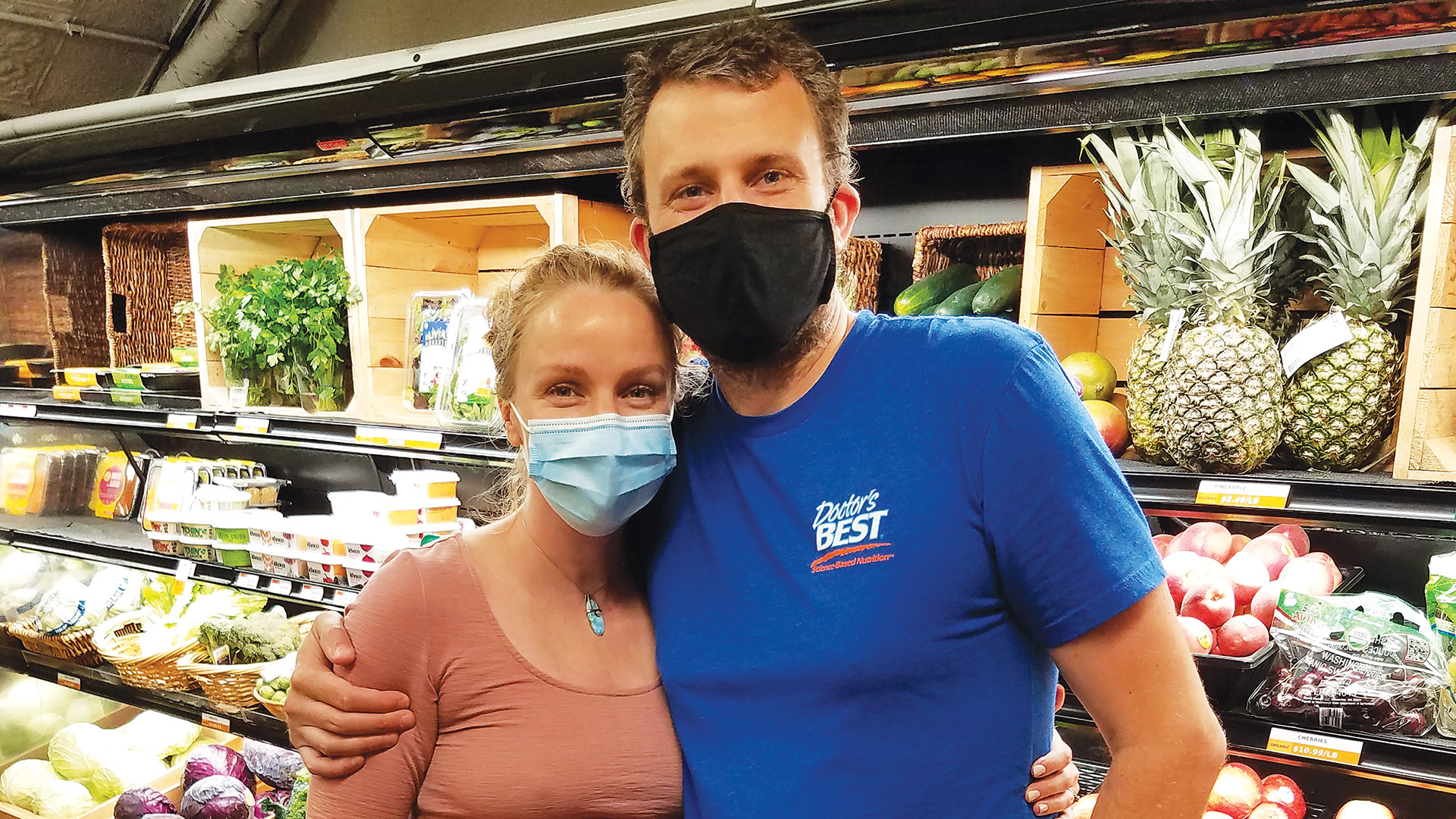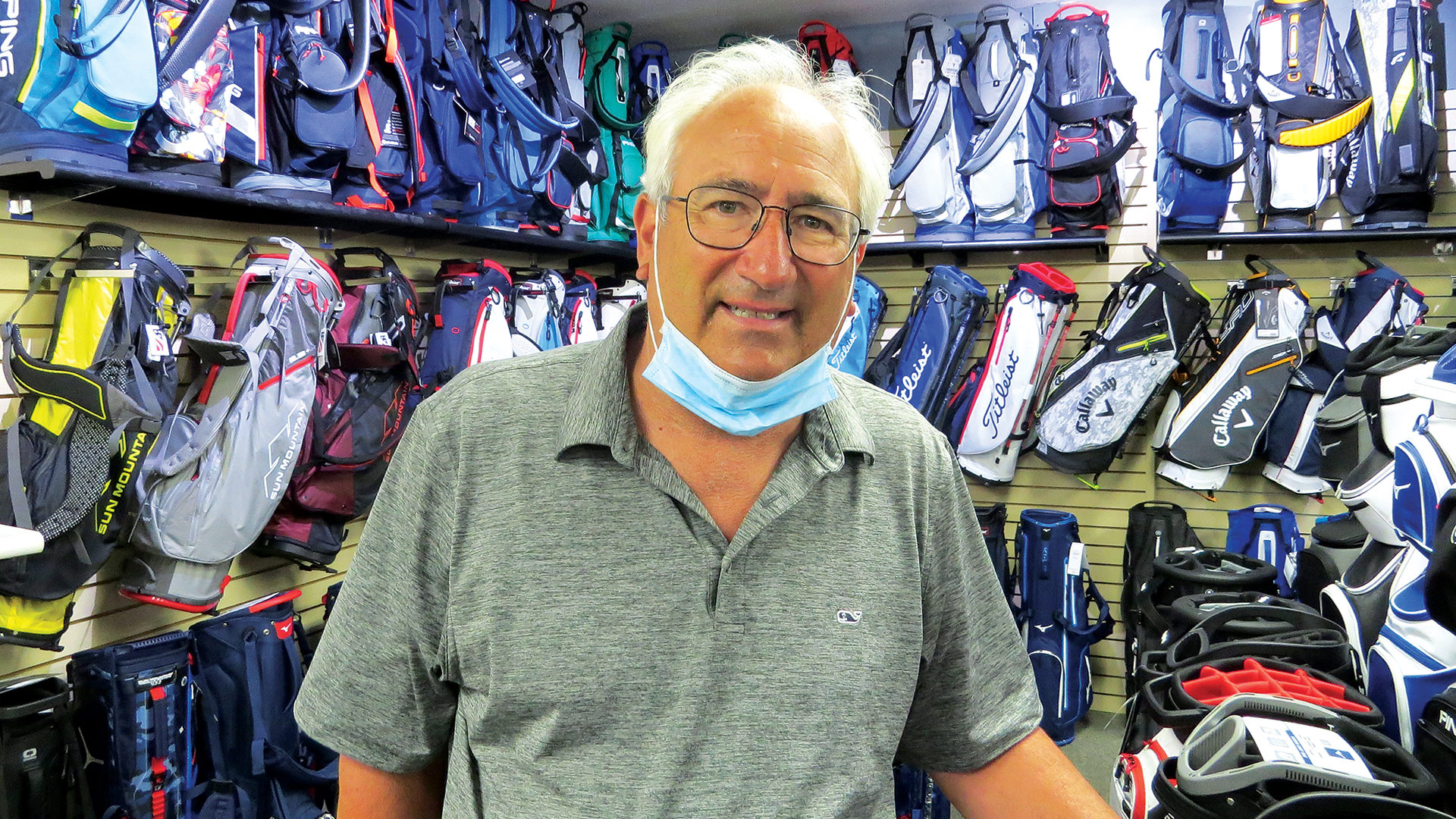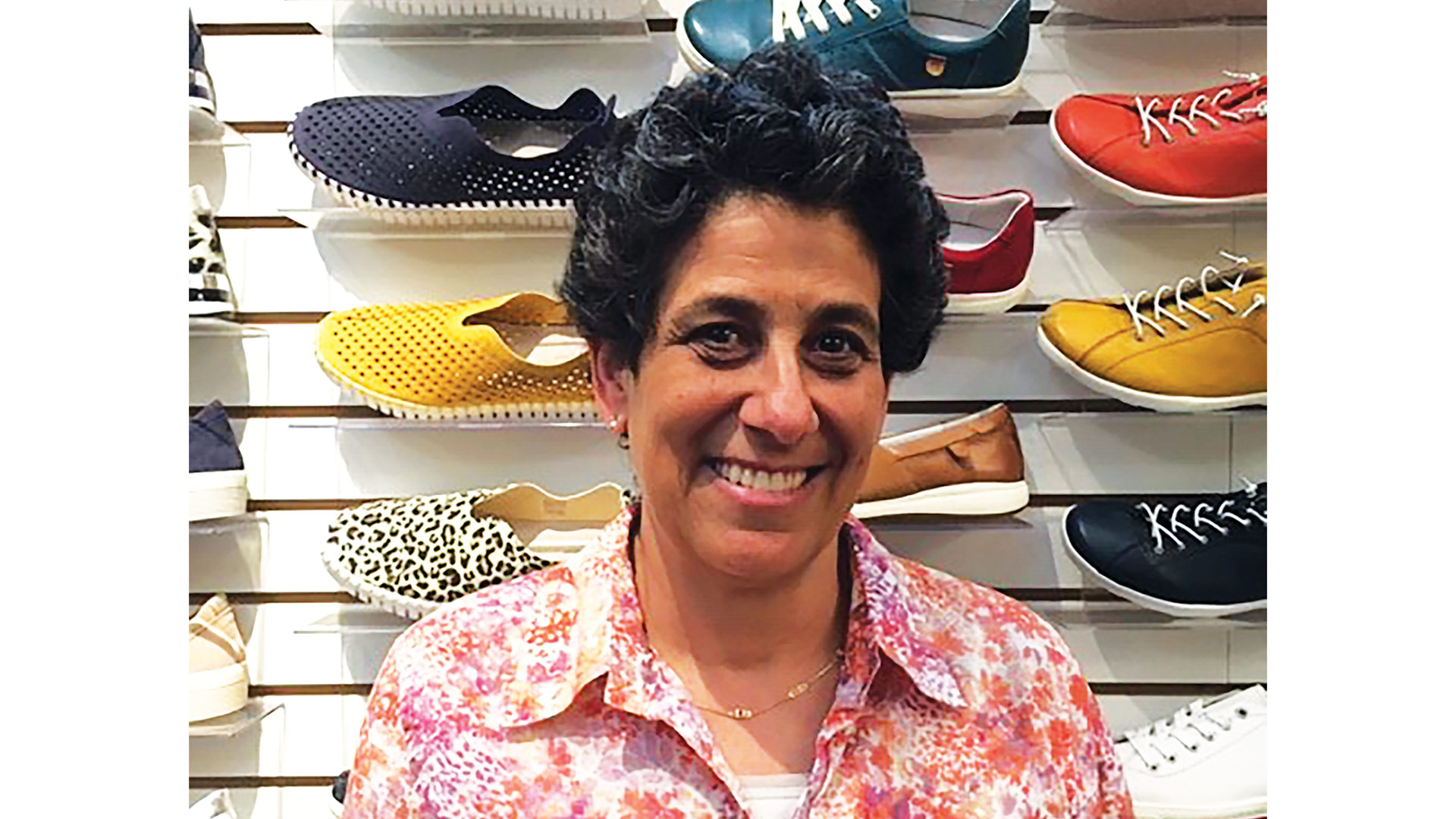
As Shoppers Gradually Return, Retailers Face Uncertain Outlook
Step Inside

Jade Jump and Nate Clifford, owners of Cornucopia in Northampton.
For Dave DiRico, the forced shutdown of retail outlets across the Commonwealth in March could not have been more ill-timed.
After all, late March is when many golfers, a good number of them armed with gift certificates from the holidays, start filing into his store in West Springfield, DiRico’s Golf & Racquet, and reload for the coming season. They come in looking for new clubs, balls, bags, shoes, and other accessories.
And they keep coming in through the spring, said DiRico, noting that, aside from the holidays, March, April, and May are by far his busiest months.
But not this year, obviously, as he was closed completely until early May and then open for curbside sales only — something this business isn’t really suited for — for several weeks.
But when he did reopen … well, the surge in business might not make up for everything that was lost during the shutdown, but it has been significant and in many ways surprising. Indeed, in addition to what could be called pent-up demand — people who needed to reload and had to wait until he was open to do so — the pandemic has actually created a mini-explosion of interest in golf, because it’s one of the few sports that can still be played under the current restrictions and advisories on social distancing.
“Things took off … it’s been crazy,” DiRico told BusinessWest. “One of the few outdoor activities you can have right now is golf; we have kids who were supposed to do internships and can’t, and they’ve taken up golf. We have kids who played baseball and summer sports and couldn’t play those, so they’ve taken up golf. We have spouses who’ve never played the game who have taken up golf.
“Couple that with our regular business,” he went on, “and June and July have taken off like a rocket ship.”
Nate Clifford has also navigated the ups and downs of shutting down and reopening at Cornucopia, the natural-foods store he and his wife, Jade Jump, own at Thornes Marketplace in downtown Northampton. They were among many shop owners who had to shift their business model on the fly to survive the past few difficult months.
“Shoppers are saying, ‘I just wanted to shop with somebody locally.’ We’re hearing a lot of that. I think that’s awesome.”
In fact, March 15, the day they and all the other Thornes stores shut down, was the couple’s one-year anniversary of buying the 40-year-old establishment. Though sales of food and wellness products may have made Cornucopia an essential business in the state’s eyes, Thornes made a decision to shutter the whole complex, and that meant Cornucopia, too.
“We understood, but we made an impassioned plea to the landlord to give us some access for pickup and delivery, with the goal of helping people, especially the older population around here who need us,” Clifford said. One day later, on March 16, they were back in business with that new model.
“We put a simple order form up on the website and told people, ‘you shop here; you know what’s here — what’s your wish list, and we’ll get the best possible order for you.’ We delivered, or you could pick it up and we’d run it out to you, put it in your trunk or in the passenger window, whatever you were comfortable with. We did that for three months, and we were overwhelmed with the support we got.”
That support was certainly reflected on June 15, the first day shoppers were allowed back in the store itself. “We had such a rush of people, I had to step into the back room to shed a few tears,” Clifford said. “I thought, ‘we’re going to be OK.’”
Unfortunately, not all retailers can say the same thing. They’ve seen some pent-up demand, to be sure, but 2020 is turning into a very challenging year as many shoppers are staying home, cutting back on their spending (or both), and doing most of their buying online.
Still, retailers are happy to be open again, even if the long-term outlook is mixed, and consumer confidence remains uncertain.
One Step at a Time
Sharon Cohen, who has owned Footbeats for Women at Thornes for the past four years, noted that, without college students and tourists from out of town, business is slower than is typical for this time of year, but customers are returning steadily. She’s happy to see them, especially after instituting the safety measures mandated by the state — and by common sense.
“We’ve revamped the way the store is laid out to promote social distancing,” Cohen said. “Shoppers are saying, ‘I just wanted to shop with somebody locally.’ We’re hearing a lot of that. I think that’s awesome.”
After Thornes was shut down in mid-March, Cohen launched a website so customers could still purchase her shoes, and, like Clifford, she delivered to peoples’ homes. Every Friday afternoon, she used Facebook Live to talk about shoes in stock and offer commentary on trends and new styles.
“I’d pick them off the displays on the wall and talk about them. Customers would text and ask questions about cost or size,” she said, noting that she will likely continue that practice. “We tried new, inventive ways to meet the customers.”
In the store, she tries to strike a balance between customer needs and safety; for example, when customers try on a pair of shoes, if they are leather and cannot be sanitized, the shoes are put in quarantine for 24 hours, as per Centers for Disease Control and Prevention (CDC) guidelines.

Dave DiRico says a mini-explosion in the popularity of golf has helped offset some of the huge losses incurred when his shop was shut down by the pandemic during the spring.
Thornes management has instituted many new protocols and equipment, including iWave ionizing air filters that heighten air quality, foggers that sanitize the building nightly, and door monitors at each of the two open entrances to ensure that people entering wear masks and sanitize their hands. The complex also installed hands-free door openers on bathroom doors.
“Thornes has done a lot to prepare for our opening, and we continue to stay educated and follow safety protocols,” said Richard Madowitz, the marketplace’s co-president. “We are receiving consistent positive feedback from shoppers on the cleanliness of the building and their comfort. We are providing a safe environment.”
All shared tables and chairs on the building’s second and third floors have been removed, and directional arrows on the floors separate traffic and promote social distancing.
“Signage is everywhere,” Madowitz stressed. “Each store is managing its state-mandated capacity count, and Thornes itself is managing the state-mandated capacity counts for its common spaces without shops.”
“I make sure people who come into the store feel safe. I’m doing what I feel is right by my customers and staff. That’s my focus.”
Mask compliance is high, at 99%, he noted, adding that “masks are not required for those with medical conditions that prevent them from wearing one.”
Despite what he calls a “vocal minority” making waves nationally about mask wearing, Clifford said his customers have been respectful of the mandate.
“We’re dealing with people who have health issues, and I’d say the average customer spending big amounts is over 50, getting supplements, taking to our expert staff. We want them to feel safe,” he told BusinessWest. “For those folks who don’t want to wear masks, even for legitimate reasons, we still have pickup and curbside. But I make sure people who come into the store feel safe. I’m doing what I feel is right by my customers and staff. That’s my focus.”
Visitors to Holyoke Mall are greeted with a similarly wide range of mandates, from face coverings and six-foot distancing to directional arrows and guidance to wash hands, use sanitizer, and avoid touching products unless purchasing them, said Lisa Wray, the mall’s director of Marketing.
In return, the mall has enhanced its cleaning and sanitizing of the common areas and numerous touch points, restrooms, seating areas, and food court, and the cleaning team is utilizing new electrostatic sprayers, leveraging the same technology used to clean hospital rooms, using an approved disinfectant recommended by the CDC. In addition, Holyoke Mall employees, security, housekeeping staff, and contractors undergo daily health screenings.

Sharon Cohen says she used online outreach and a sales website to stay afloat during the shutdown.
All those steps were necessary, Wray said, to not only bring customers back, but make them feel safe upon return.
“Having our tenants close with thousands of employees and their livelihoods impacted is certainly difficult; however, the safety and well-being of our guests, employees, and tenants is of primary importance,” she told BusinessWest.
“We have been seeing guests steadily return to the shopping center, and even with reduced occupancy, tenants have been seeing strong sales,” she added. “With the back-to-school season upon us and the sales-tax holiday weekend at the end of August, we’re hopeful the months ahead will continue to trend positively. We’re cautiously optimistic that the fourth quarter will continue to ramp upward, as guests adapt to this new way to shop.”
Warning Signs
That optimistic view isn’t shared by the entire retail industry. Just last week, two businesses at the Shops at Marketplace in downtown Springfield — Serendipity and Alchemy Nail Bar — announced they were closing, unable to stay afloat after the forced pandemic closure and an inability to procure business aid from either the federal Paycheck Protection Program or the city’s Prime the Pump grants.
Meanwhile, on a national level, Tailored Brands, which owns suit sellers Men’s Wearhouse and Jos. A. Bank, is closing hundreds of stores and drastically reducing its corporate workforce as the pandemic continues to decimate the retail industry.
GlobalData Retail recently noted that year-over-year sales of men’s formal clothing fell by 74% between April and June, and not just because stores were closed. “While this deterioration will ease over time, demand will remain suppressed for the rest of 2020 and well into 2021 as office working, business meetings, and socializing are all reduced.”
Fortunately for DiRico, the pandemic has done the opposite in the golf sector, creating some opportunities in the form of new players who need equipment — with many of them using stimulus checks to buy it. But there are challenges as well, starting with shortages of stock caused by closure of factories and then restrictions on capacity.
“Our biggest problem right now is getting equipment,” he explained. “That’s because most of our manufacturers are based in California, where only 40% of the factory is open, which means they can only produce ‘X’ amount of clubs for the world; it’s slow in getting equipment.”
Other challenges include the many the new rules and protocols regarding social distancing and sanitizing, he went on. Still, for the customer, things are pretty much business as usual, meaning they can still try on shoes or gloves and take a few practice swings with a driver in the simulator.
‘Normal’ is not a word that comes to mind when describing operations or this year in general, but overall, the surge the game has seen will certainly help make 2020 less forgettable, DiRico went on, and it offers considerable hope for the future — if those who have taken up this difficult, expensive, and time-consuming game can find a way to stay with it.
“For the past 15 years or so, golf has been on the decline,” he said, listing cost and time among the big reasons. “Now, some of the pros I’ve talked with say they’re booked solid; they have tee times from 6:30 to 4. And membership at the country clubs is up. If these clubs can retain just 15% of these new golfers, they’ll be in good shape.”
For Cornucopia, the pandemic offered an opportunity to build an online, pickup, and delivery presence it might not have otherwise, Clifford said — one it will continue to maintain, opening up new business avenues.
“We were thrilled to be able to pivot to that quickly. That’s one thing Jade and I do well, being flexible and doing whatever we need to survive. We’re resilient, and now that we have a strong foundation, if we were ever to experience another shutdown, we’ll be able to continue the cash flow.”
These days, sales volume isn’t what it was on reopening day on June 15, and won’t be until colleges are back in session. “That’s when you normally see more foot traffic; July is not a busy retail time,” Clifford noted, adding that a weakened tourism season isn’t helping, as even visitors to the Berkshires often make their way to downtown Northampton for an afternoon. “That’s not happening right now.”
But he’s cheered that all the Thornes businesses are open seven days a week. “That has caused a lot more consistency in the shopping experience, when the stores are open and welcoming people and wanting them to come in and physically shop.”
And hoping that extended shutdown is a thing of the past.
Joseph Bednar can be reached at [email protected]




